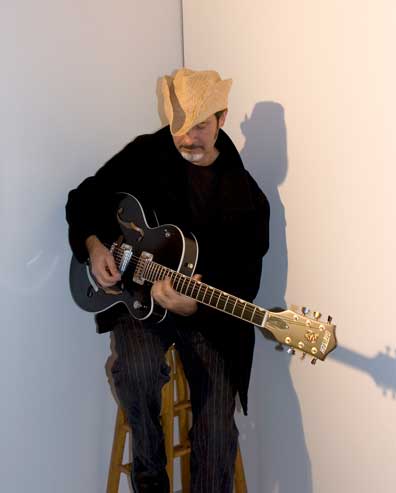Peter Parcek: Absorbing and transforming a multitude of influences into a personal voice on The Mathematics of Love.It All Adds Up
By David McGee
THE MATHEMATICS OF LOVE
Peter Parcek
Redstar EntertainmentLet’s face it, when Buddy Guy tells you “you’re as bad as Eric Clapton,” and Pinetop Perkins makes you his touring bandleader, you’re flat dealin’ some blues. Born in Middletown, CT, Parcek didn’t exactly land in a hotbed of blues, but he corrected that problem by relocating to London after finishing high school and soaking up the wisdom he gleaned from watching the likes of Clapton, Beck and Peter Green in many a smoke-filled club and before the first two were superstars. Upon returning to the U.S. he made it his business to see blues titans on the order of the aforementioned Mr. Guy, along with Albert Collins, Hendrix, Muddy, Skip James, et al. Having taken up the guitar at a young age himself (his parents purchased his first axe with S&H Green Stamps—anyone remember those?), he honed his style and joined a Boston blues band, migrated to more adventurous shores as a member of the Singhs, and in 2000 began pursuing his own thing with a band now dubbed the Peter Parcek 3.
This history is relevant because The Mathematics of Love is his national debut, and it brims with the multitude of influences the gifted Parcek has absorbed and transformed into a personal voice.
Peter Parcek infuses Fred McDowell’s ‘Kokomo Me Baby’ with a rockabilly-style shuffle, and a little more…The rockabilly-style shuffle with which he infuses his delightful treatment of Fred McDowell’s “Kokomo Me Baby” sounds like it might have been inspired by Big Bill Broonzy and Washboard Sam’s “Diggin’ My Potatoes,” which was rockabilly when the duo recorded it in 1953, before the term had even been coined. His own downcast “New Year’s Eve Blues,” with its lub-dub drumbeat and anguished, ruminative guitar complementing Parcek’s low-key, mournful vocal, is as forlorn an epistle as you’ll want to hear from someone who can’t find any kind of company on a night when everyone else is partying. Speaking of forlorn, Parcek brings the Delta and the big city together—by way of his weeping National Steel and his band’s dolorous stomp—when he gets down to the basics of his own abiding, corrosive heartbreak in disclosing its cold calculations in the title song, which has at least some dark humor going for it when Parcek pleads, “Don’t erase me/you know the mathematics of love are/plain and simple as A-B-C.” In the North Mississippi blues of Jesse Mae Hemphill’s “Lord, Help the Poor and Needy,” the dirge-like rhythmic drag and Parcek’s guitar—rising from plaintive and desolate to a fierce, anguished cry—establish the soundscape for a plea for some divine intervention to lift up the earth’s downtrodden and disenfranchised in a song that is, sadly, more timely now than ever. Those who have previously been put into a deep but troubled sleep by Cat Power’s unimaginative and quite boring interpretation of Hemphill’s prayer are in for a surprise.
But for this reviewer, The Mathematics of Love sounds as if its godfather might be J.J. Cale. Cale’s laid-back groove simmers in many of its songs; Parcek’s own writing belies a Cale-like country-blues poetry influence—“I cried tears like diamonds/froze before they hit the ground/I waited all night on my babe/while the snow was driftin’ down” is one such striking evocation of solitary despair that could well have come from Cale’s pen—and the artist doubles down on this comparison by way of his dry, weary vocal timbre. Like Cale, he doesn’t have a great deal of color in his voice, but more near-palpable soul than any one man should be allowed—the point is always made, and you don’t forget it. He chooses to offer Harlan Howard’s timeless “Busted” as a southern soul, organ-infused instrumental, and a gritty, spiky performance it is, but you know if he’d tackled it vocally he would have done justice to its many other vocal incarnations including Johnny Cash’s. The bluesy tonal shadings he explores in deconstructing the melody line add plenty of emotional shading in the absence of words, then the spacey, psychedelicized, free-form, phased jamming in the final two-and-a-half minutes of this near-eight-minute version takes the song to an otherworldly place, as if a door opened at the five-minute mark and Parcek floated free into some Salvador Dali landscape. A most intriguing outing, this song, and for that matter, this album. For Peter Parcek, The Mathematics of Love is a bonafide coming out for a solo artist who has found his voice, irrefutably, indubitably and provocatively.
Peter Parcek’s The Mathematics of Love is available at www.amazon.com
Founder/Publisher/Editor: David McGee
Contributing Editors: Billy Altman, Laura Fissinger, Christopher Hill, Derk Richardson
Logo Design: John Mendelsohn (www.johnmendelsohn.com)
Website Design: Kieran McGee (www.kieranmcgee.com)
Staff Photographers: Audrey Harrod (Louisville, KY; www.flickr.com/audreyharrod), Alicia Zappier (New York)
E-mail: thebluegrassspecial@gmail.com
Mailing Address: David McGee, 201 W. 85 St.—5B, New York, NY 10024



